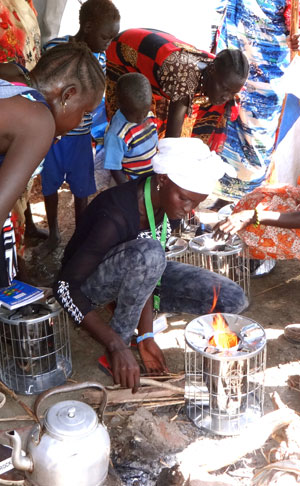Partner Spotlight: Food and Agriculture Organization of the United Nations (FAO)
The Food and Agriculture Organization of the United Nations (FAO) is a leading member of the Safe Access to Fuel and Energy (SAFE) Humanitarian Working Group, through which it is coordinating its SAFE activities with other agencies, including the Global Alliance for Clean Cookstoves (Alliance). Through the development of tools, guidelines and programmes in the field, FAO is responding to the fuel needs of crisis-affected people, particularly women and young girls, and addressing the multi-sectoral risks and challenges they face when collecting, producing and using fuel. SAFE is an important part of FAO’s work on building the resilience of livelihoods to threats and crises.
FAO adopts a multi-disciplinary approach operationalized through three pillars:
- Ensuring a sustainable supply of fuel and energy for cooking and productive activities;
- Reducing the demand for fuel and energy through the promotion and dissemination of energy-efficient technologies, including efficient cookstoves; and
- Livelihood support and diversification activities.
These three pillars are interlinked and allow FAO to harness the technical and programmatic expertise needed to ensure a comprehensive response.
At country level, FAO is carrying out fuel needs assessments and developing multi-disciplinary SAFE strategies and programmes. As part of FAO’s emergency livelihood response programme in South Sudan, specifically under a pillar focusing on minimizing the environmental impact of Internally Displaced People (IDPs), FAO promoted the use of fuel efficient stoves in camps and hosting areas surrounding the camps. Approximately 40,000 durable and portable fuel-efficient cookstoves were procured in 2015 based on specific criteria appropriate for emergency settings. Beneficiaries were trained on how to use and maintain the stoves as well as on fuel-saving cooking practices.

In Kenya, FAO is engaging with host communities to promote the sustainable production of charcoal using improved kilns that burn small branches and invasive plant species as a feedstock in order to reduce negative impacts on the environment. The sustainably produced charcoal will be sold to refugees in the Kakuma camp through a voucher scheme supported by MasterCard. This aligns with the Alliance’s market-based model for long-term sustainability, and contributes further to FAO’s interest in reducing dependence on humanitarian assistance and enhancing involvement of host communities.
FAO’s work on SAFE has benefitted from support and coordination from the Alliance, which has taken a lead role in ensuring resource mobilization, promoting international standards, brokering partnerships, capacity building and research to ensure a timely and effective response to the fuel needs of crisis-affected people.
